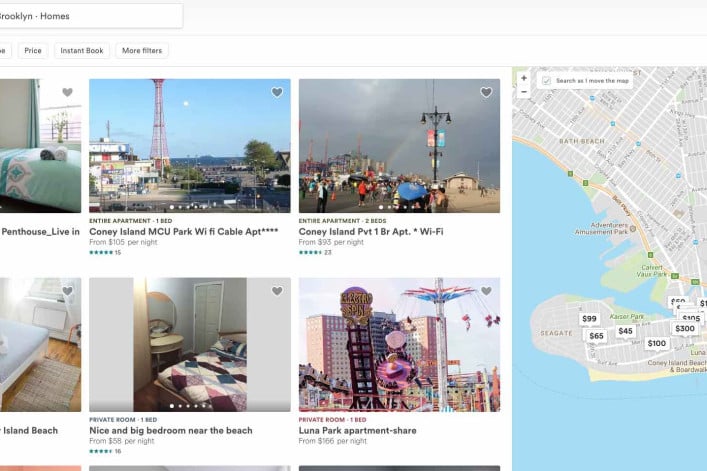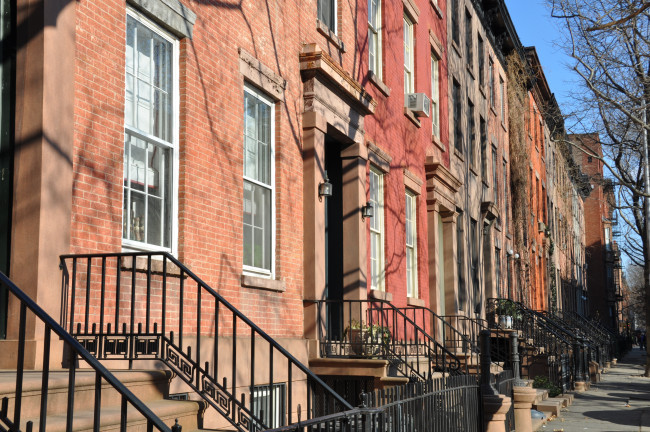Attention Airbnb hosts: Your messages may not be so private after all
Airbnb hosts who are breaking building rules by renting out their apartments should know to expect scrutiny from neighbors and building management. And an ongoing case out of a co-op complex in Coney Island shows that even some light subterfuge won't necessarily work to throw the authorities off the scent.
The legal battle has its roots in Trump Village, a seven-building co-op community near the Brighton Beach line, named for the president's developer father Fred Trump. An apartment owner's alleged Airbnb use came to the attention of building management in mid-2016, according to Trump Village West general manager Igor Oberman. What first tipped neighbors off was the age of the alleged visitors.
"Our complex is a naturally occurring retirement community," Oberman explains. "The majority of residents are 60 plus, or even 75 plus. So when you see guys with bright shirts and big beards and backpacks, they kind of stick out in our population mix."
Also, he says, "We had complaints from shareholders that there were parties happening."
With residents' eyes on the interlopers, Oberman says he traced them to a particular apartment, which he confirmed by consulting the Airbnb website and looking at the photos. The unit was purchased by a real estate broker in 2014, who bought two other co-ops around the same time, according to property records.
Oberman typically combs Airbnb and other short-term rental sites on a quarterly basis to see if anything in the complex shows up. When one does, or he gets a tip that someone is doing illicit vacation rentals, he sends the apartment owner a letter saying that it's against the rules, and that's usually the end of it.
"We've never had anyone fight it. Usually, they weren't aware of the rules and we made them aware, so they stopped it," he says. "This guy didn't want to."
Instead, Oberman claims that the man changed the profile image on his Airbnb account to one of a woman, and changed the listing photos and address to show a building nearby, then carried on with his Airbnb bookings for at least a short period of time. In December 2016, Trump Village sued the man to terminate his lease.
As part of the lawsuit, which is ongoing, the co-op subpoenaed communications between guests and the Airbnb account holder. Last week a judge ordered the release of the records, overruling the man's objections and some letters registering protest on Airbnb's behalf. The documents show would-be guests were perplexed by the photo changes on the account, and seem to show the host explaining that he changed the address to make the building "more locatable on the map." Other messages show the host instructing a group of seven to enter through a side door to avoid security.
And on June 22nd, 2016, as the issues with the building were coming to a head, an irate guest wrote:
I got your message: "Andrey, Please do not Answer or Open door to anyone. I think security here have some issues with airbnb. If you here someone knocking just wait two minutes quite. Call me if any issues or questions. Thanks" and I'm not happy with this situation at all. I need you to take keys from apartment tomorrow 06/22 morning. I don't want to spent my vacation sneaking from security. You need to resolve issues with security before renting your apartment. I also need one night refund. Please, let me know when tomorrow morning you can check me out. I prefer 9am. Thank you.
The judge, Brooklyn Supreme Court Judge Carl Landicino, was right to order the disclosure, says Steve Wagner, a co-op and condo lawyer with the firm Wagner Berkow (and a Brick sponsor).
Airbnb "should have lost. They’re protecting someone who’s breaking he law," Wagner says. "The zoning doesn’t permit it. The certificate of occupancy doesn’t permit it. The proprietary lease doesn’t permit it. The house rules don’t permit it. Airbnb knows this. Whose interest are they trying to protect?"
The letters on Airbnb's behalf by the firm ZG Subpoena were, attorney Toby Cohen notes, pretty pro forma.
The letters "just included the standard general objections that everyone includes in discovery responses," he says, "and the last letter said that they'd turn over what they had once the motion to quash is decided."
For now, the case is ongoing. The apartment owner declined to comment on this seemingly damning disclosures, but says, "As soon as this matter is closed in court, I’ll call you and tell you everything, probably more than you'll want to hear."
Oberman, for his part, says that he hopes that the case will serve as a warning to co-op owners and others who might be tempted to try to run a fly-by-night hotel out of their apartments, and a call to arms for building managers seeking to ferret out the short-term renters in their midsts.
"I hope it gets out that you can't hide behind Airbnb.com, that your communication is not private," he says. "I hope it will convince people to not break the rules. All I'm trying to do is to get people to follow a set policy. I don't want boards to think there's nothing we can do."
An Airbnb spokesman declined to comment.
You Might Also Like


























